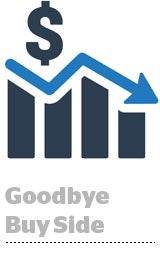 Here’s today’s AdExchanger.com news round-up… Want it by email? Sign up here.
Here’s today’s AdExchanger.com news round-up… Want it by email? Sign up here.
Take That
Rubicon Project reported Q4 and full-year 2017 earnings Wednesday. As expected, eliminating buy-side fees took a serious bite out of its revenue. For the quarter, revenues were $31.4 million, down from $72.7 million in Q4 2016, and full-year revenues fell to $155 million from $278 million. Its take rate was 11.6%, which has remained consistent since the company eliminated buyer fees in November. Previously, take rates had been as high as 25%. “Our desire was that by eliminating buy-side fees, it would put competitors that still charge buy-side fees in an uncomfortable position and have them eliminate it as well,” Rubicon CEO Michael Barrett said on the earnings call. “We are not seeing pressure from the sell side from a rate standpoint.” Rubicon also cut $44 million in annualized spending by consolidating back-office functions, eliminating 100 positions and reducing $20 million in capital expenditures. Read the release. Its stock price jumped in after-market trading.
Tales From The Crypto
Six weeks after Facebook banned cryptocurrency-related keywords, Google has taken a similar step. Its ban on crypto-related terms and advertisers will take effect in June and will cover search, display and YouTube ads as part of a new initiative targeting “speculative financial products” including binary options and foreign exchange markets. Read the blog post by Scott Spender, Google’s director of sustainable ads. More in The Wall Street Journal. The change comes a week after the SEC called out online platforms for enabling unlawful digital trading of assets and information.
Trade Wars
Digital Content Next, an online publishing trade group, sent an email cautioning members from participating in the GDPR cookie consent framework opened to public review last week by the IAB, which finalizes next month [AdExchanger has more on that]. The framework “was clearly designed by ad tech companies and included endorsement from 23 ad tech companies and, most notably, zero publishers,” writes DNC CEO Jason Kint in the email, obtained by AdExchanger. The IAB framework envisions publishers opting in to a program where advertising intermediaries could target users across sites under a single consent agreement. Limiting ad personalization and targeting would bring down inventory rates, argue IAB proponents. The DCN is pushing publishers to try building “new demand through context and true relevance.”
Throwing A Bone
To help publishers retain more paying readers, Google will prioritize news organizations to which users subscribe higher in their search results, Bloomberg reports. Google’s parent, Alphabet, will also share search data with publishers to help them target users most likely to buy a subscription. The news follows Google’s decision to abandon its “first click free” policy, which penalized publishers with paywalled articles in their search rankings. Publishers are increasingly pushing platforms to help them gain paying subscribers but are still struggling to make meaningful revenue through their distribution. More.
But Wait, There’s More!
- CFO Discusses Twitter’s Future – CNBC
- YouTube Will Link To Wikipedia Below Conspiracy Videos – BuzzFeed
- Campbell’s Picks Publicis After Big Agency Review – AdAge
- InMobi Partners With GeoEdge For Mobile Ad Verification – release
- How Amazon Became Corporate America’s Nightmare – Bloomberg
- Taking Action Against Britain First – Facebook
- What’s Next For Programmatic Advertising? – eMarketer
- Viacom Cozies Up To YouTube As TV Giants Go Digital – Business Insider
- Datorama Adds AI-Driven Analytics Feature – release
- Oath’s Mahlman On Why Ad Marketplaces Are Dwindling – The Drum
You’re Hired!
- Karen Brophy Named Head Of Lakana, SVP Of Nexstar Digital – release
- Tremor Video DSP Expands Marketing Team – release
- Digitas Names Kingsley Taylor Managing Director, SF – release
- Local Media Consortium Appoints Tom Sly As Interim CEO – release










